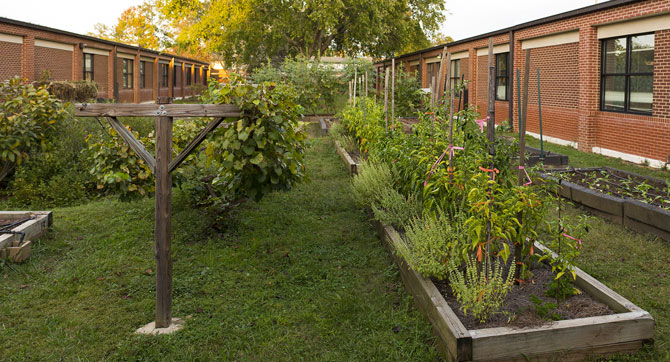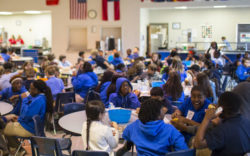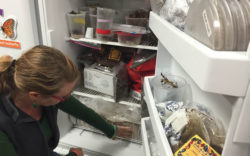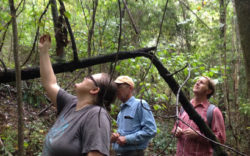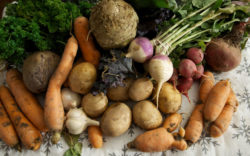Clarke Middle School has a large, beautiful vegetable garden that’s easily spotted on Baxter Street. There’s another garden at the school that’s also used for learning; however, most of the students have typically left their middle school days behind them.
Nestled in an inner courtyard at Clarke Middle is the Athens Area Master Gardeners Association’s garden, filled to the brim with fruits, vegetables, flowering plants and herbs. Master gardeners use it as one of several experiential learning sites, where members can meet their requirement for volunteer hours. The Athens-Clarke County UGA extension office trains master gardeners. Brand-new master gardeners must complete 50 volunteer hours, and everyone else must complete 25 hours each year to maintain their membership.
“In a year’s time, we’ll have 35–40 different people working over here, and what we ask them to do is sign up for a week at a time,” says Merry Anderson, one of the master gardeners in charge of the garden at Clarke Middle School. “We try to have at least two people on each week, because during the summer it gets pretty hectic over here. Sometimes we’ll get 50–60 pounds of vegetables at one time, sometimes even more.”
This program, called Plant A Row, works with the Athens Area Emergency Food Bank, located at 640 Barber St. “What we do is provide emergency food to families and individuals who live in Athens-Clarke County who are having some sort of financial crisis,” says Kim Ramos, executive director of the food bank. “It can be something as simple as, ‘Hey, I really don’t have enough money to have a birthday party for my 10-year-old. If I go to the food bank and get groceries, I can now have this birthday party for my 10-year-old.’ That’s a perfectly legitimate reason to use the food bank.”
The master gardeners plant, care for and harvest the fruits and vegetables grown in the Clarke Middle School garden, then take them to the food bank. The food bank, in turn, can provide fresh fruits and vegetables to its clients rather than only canned options.
Before they plant, master gardeners have a conversation with Ramos about what they’re planning on planting so she can provide feedback from the clients themselves about vegetables that they like more than others. The gardeners want to ensure that they are planting varieties of vegetables those who will receive them will enjoy cooking and eating. Sometimes, it doesn’t go quite as planned.
“Then there was the year that we planted radishes,” Anderson says. “And, you know, a few radishes would go nicely in a salad, and there’s actually a radish slaw that you can make. But… because they all ripened at one time, we wound up with 63 pounds of radishes. What do you do?”
Just like farmers acting as resources at farmers markets or butchers behind the counter, Ramos and her staff are sometimes able to point clients unfamiliar with a particular vegetable in the right direction and suggest dishes and techniques they may have had in the past. The gardeners can act as a resource, too. “Many people say, ‘Well, what do we do with a tomatillo?’ The Internet’s invaluable,” Anderson says.
The gardeners use the garden to experiment a little bit with growing fruits and vegetables you wouldn’t normally see in a home garden, as well as when to pick things, how to prevent pests and how to care for the different varieties.
“This is another one of our experiments that really didn’t work all that well: It was a green-bean teepee, and we used really long bamboo poles instead of trellising things like we do in some of the other beds,” Anderson says. “We thought, ‘Well, we’ll try this.’ Well, the bad news is, you can’t get to the top of it, plus, now it’s leaning. So, we’re going to have to do something else next year—go back to probably a more traditional way of doing it.”
Working in the garden also lets the gardeners educate students at Clarke Middle about where food comes from. “They can stand out here and go, ‘Oh. That’s what’s in my salad? Oh yeah!’ Anderson says. “It’s really a very satisfying project, because you know you’re doing so much good for the community.”
Like what you just read? Support Flagpole by making a donation today. Every dollar you give helps fund our ongoing mission to provide Athens with quality, independent journalism.



